Sun 26 Feb 2023
A Movie Review by Dan Stumpf: THE NARROW MARGIN (1952).
Posted by Steve under Crime Films , Reviews[14] Comments
THE NARROW MARGIN. RKO, 1952. Charles McGraw, Marie Windsor, Jacqueline White, Queenie Leonard, David Clarke, Paul Maxey. Directed by Richard Fleischer; written by Earl Fenton, Martin Goldsmith and Jack Leonard. Nominated for an Oscar for Best Writing, Motion Picture Story, 1953.
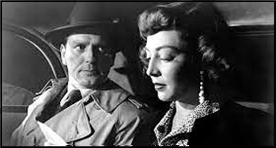
Narrow Margin is a film that will surprise and delight the viewer who comes to it without expecting too much. Like Fleischer’s other noir classic, Violent Saturday, it’s taut, professional, and engaging without being as riveting or moving as a film like Out of the Past or Detour.
I place that caveat up front because it’s easy for a film buff to come to this movie with great expectations. Director Richard Fleischer showed a lot of promise early in his career and The Narrow Margin was one of his most promising efforts. Then, too, the script is coauthored by Martin Goldsmith, whose novel and screenplay for Detour formed the basis of one of the undisputed classics of the film noir.
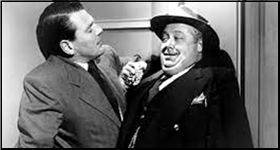
In fact there are a few echoes of that earlier work in this one, particularly in the relationship between Charles McGraw as a down-at-the-heels cop on the verge of corruption and Marie Windsor as the shrill, shrewish, shrike o! a Gangster’s Widow whom he is assigned to escort by train to testify at a trial. Both Goldsm1th and Fleischer steer clear of the deeper possibilities inherent in the story, though, and concentrate instead on the superficial aspects of McGraw’s mission.
Fortunately, having decided to be superficial, they proceed to be stylish as well. The script, terse and occasionally witty, serves the plot and actors very nicely indeed, and the camerawork, roving up and down the narrow corridors and in and out of the cramped compartments of the train where most of the action is set, earns top marks for graceful planning.
The choreography here comes across with subtle dexterity as well: As the characters move about, they alternate between clumsy struggles against their restricted environment and a smooth, natural flow inside it, impressive and suspenseful either way. And one particularly nasty fight inside a traveling compartment not only predates the Sean Connery/Robert Shaw set-to in From Russia with Love, but also excels it.
And now a word about the Cast.
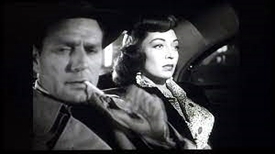
It attains the remarkable felicity that seems reserved only for B-Movies, where there are no Stars to tailor scripts for. The Narrow Margin like Mask of Dimitrios or And Then There Were None, is a film where the Character Actors have taken over,. and it is also one· of those rare occasions where they have decent material to work with.
As the brassy widow central to the plot, Marie Windsor caps off a career of playing schemers, gold-diggers and ladies of negotiable virtue. To paraphrase the joke, one watches her in this film and gets the feeling that you could go to the dictionary, look up “sleazey” and find her picture.
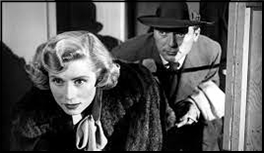
An unknown actor named Paul Maxey does a very nice turn as an enigmatic, grossly obese Railroad Cop (and the camera makes the most of him navigating his bulk relentlessly through the dwarfed corridors) but the truly outstanding role goes to Charles McGraw as the cop, distrusted by his superiors, blamed for the death of his partner, and sorely tempted by the bribes of his adversaries.
Charles McGraw spent his life doing small parts in B-Movies and smaller parts in A-Films. Fans with good memories might recall him as the kindly doctor in The Wonderful Country or the inept comic chauffeur in Once More My Darling, but his major claim to fame was as one of the two assassins (William Conrad was the other) in the 1946 film of The Killers.
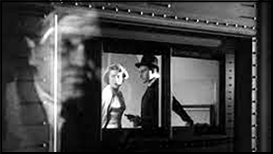
Possessed of extraordinarily beady eyes for a mammal and the raspiest voice since Lionel Stander, McGraw always looked just a little too tough to play a hero, as if any bad guys who came up against him just obviously wouldn’t have a chance.
By the time of The Narrow Margin, however, he had already been hopelessly typecast as the Muscle Heavy in dozens of westerns, costumers and gangster pies, all of which add a pleasant tension to his character when he wrestles with the temptation to either sell out his traveling companion or simply strangle her to shut her up. It’s one of those engagingly off-beat performances in a quirkily enjoyable film that seem to have happened only (and all too rarely) in B-pictures.
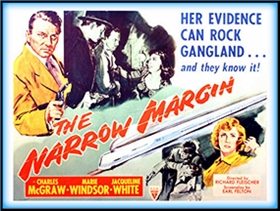
February 26th, 2023 at 11:46 pm
Television was about to make McGraw into a hero though he continued his long career as character actor as well. His relatively low-level profile as a leading man pays off here because we are never quite sure of his trustworthiness or ethics and he and the direction and screenplay milk it for every ounce of suspense. He’s a man at the thin edge of going either way and this is his crisis point.
This is easily Windsor’s best role made even more interesting by the twist that gives the film its edge. The Gene Hackman remake has its moments but can’t really come near this perfect little exercise in suspense and noir sensibilities.
February 26th, 2023 at 11:48 pm
It’s notable too how this plays on our expectations based on past movies and pulp stories. We accept everything at face value when we shouldn’t.
February 27th, 2023 at 12:10 am
If this isn’t my favorite noir of all time, it’s in the top three. In his review, Dan mentions the other two.
February 27th, 2023 at 12:34 am
I saw The Narrow Margin on the big screen and it made me a fan of Charles McGraw and Richard Fleischer, but I have never felt that way about Marie. I liked McGraw so much that when Casablanca went to series and he was cast as Rick, despite the cheapness, not of production but the lack of thought I stayed his Rick throughout the run.
It seems to have become a fashion to find McGraw’s career wanting, but he did pretty well; and he had a second series, The Falcon, duller but better. In any case, he was in top support on film, and should not be considered a minor or day player.
February 27th, 2023 at 3:22 am
Barry, total agreement on McGraw who had a lot longer career than some leading man flashes in the pan. He was solid as a lead, a villain, a psycho, a sympathetic bad guy, or a good guy and at home in Westerns, military drama, drama, crime, and comedy.
He led three series and was good in all of them even when their quality varied.
He got more out of that craggy face, gravelly voice, and tough guy persona than many leading men did a pretty face.
February 27th, 2023 at 9:14 am
Credit where it’s due: the obese railroad detective is played by Paul Maxey, not David Clarke (who’s one of the heavies).
February 27th, 2023 at 11:59 am
A really excellent noir, and I’m always a fan of mysteries set on trains. One small correction; the railroad cop was played by Paul Maxey, not David Clarke.
February 27th, 2023 at 1:20 pm
Thanks, guys. I didn’t remember David Clarke as being an overweight kind of fellow, so I was wondering about that. I’ll make the correction!
February 27th, 2023 at 7:04 pm
As much as I like The Narrow Margin, I prefer Armored Car Robbery, also directed by Richard Fleischer, in which Charles McGraw seems to be playing the same character. More location work and a superb villain, played by William Talman, give that film the edge.
February 27th, 2023 at 9:34 pm
Look for a bearded Charles McGraw as the guy who trains the gladiators in SPARTACUS. Paul Maxey had a supporting role as the mayor in THE PEOPLES’ CHOICE, the old TV sitcom with Jackie Cooper and Cleo the basset hound.
February 27th, 2023 at 9:36 pm
Many people buy into Armored Car Robbery’s superiority, at least from an entertainment point of view. That is something personal, and I don’t share it, starting with its title. Location work and villainy may count, but a terrific story, well executed with a surprise ending hits it out of the ballpark for me.
March 1st, 2023 at 9:03 pm
I admit that when the name ‘Charles McGraw’ is mentioned I immediately associate this talented player with, ‘The Killers’ and also with ‘Spartacus’. There’s nothing quite like seeing brawny-but-timid Kirk Douglas drown Charles McGraw in a vat of hot stew. Maybe I have a morbid turn of mind. The ferocity of that scene has always stuck with me.
But Charles McGraw and Lawrence Tierney just might be my two favorite heavies of all time. They are spooky nasty.
Be that as it may. I have to give big props to this discussion for reminding me of this film’s “men’s room battle”.
If I ever saw this scene in the course of absorbing this great flick on late-nite TV, well I must have been distracted by something else going on in the room like a stock market crash, something must have turned my eyes away from the screen, because it somehow did not stay in my mind. Criminal negligence on my part. I can’t account for it!
I’ve always been an admirer of James Bond vs Red Grant on the Orient Express. There’s nothing I like better than seeing that filthy Russkie stooge Red Grant, get his comeuppance. He drinks red wine with Dover sole. My god.
So this is why I give thanks to this chat. I wouldn’t have thought it possible but its so. The men’s room beatdown from ‘Narrow Margin’ is indeed better than Connery vs Shaw. What I always wanted from the Bond scene was what McGraw does –mop his brow and catch his breath.
Ah well. I’m a fight-choreography purist. I can hardly believe I’m typing these words. I’m readjusting my universe. But yup –I’m convinced. That Narrow Margin mayhem is astounding. It’s disappointingly short but –I must agree — the fight devotee is well-rewarded by all the added ferocity. I wish more flicks were this potent.
Big thanks for re-orienting me to this great good wisdom. By God, that Mafia lout gets a thrashing.
March 14th, 2023 at 4:01 pm
Haven’t seen this for ages but have uniformly excellent memories of the cast, plotting, and execution; I’m also a sucker for stories set on trains, from Murder on the Orient Express to Horror Express. Feel obliged to mention Windsor’s role in Stanley Kubrick’s The Killing. And McGraw, holy cats, I love him not only for himself, but also for the incredible roster of people with whose careers his intersected, e.g., Robert Wise (Blood on the Moon), Stanley Kramer (The Defiant Ones), Kubrick (Spartacus), Alfred Hitchcock (The Birds), Richard Brooks (In Cold Blood), Clint Eastwood (Hang ‘Em High), Robert Aldrich (Twilight’s Last Gleaming)…and, of course, the GREAT Richard Matheson (the original Night Stalker). Wow!
June 8th, 2023 at 10:35 am
Belatedly:
I was just wondering if anybody here took notice of one of Charles McGraw’s final roles: as Robert Blake’s burned-out father in In Cold Blood?
Something of a last hurrah, and McGraw aced it.
Sidebar:
Does anybody here recall Charles McGraw’s mostly silent bit as one of the bit-part cops in It’s A Mad, Mad, Mad, Mad World?
I watched it the last time or so that TCM ran it, and a vagrant thought occurred:
If (Heaven forbid) Spencer Tracy’s health had forced him to drop out of IAMMMMW in mid-filming … Charles McGraw could have taken over as Captain Culpepper – and ran away with the finish of that movie …
Just a private thought of mine; feel free to scoff, if you wish.
Still, if you happen to watch MadX4 World again anytime soon – think about it, OK?